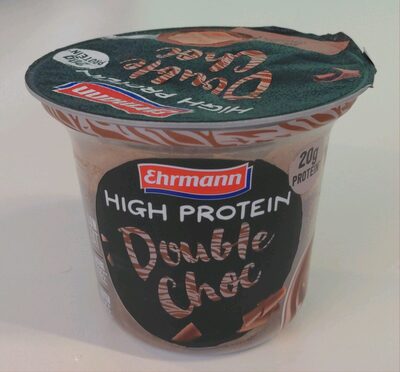
Barcode: 4002971247909
High protein double choc
DOUBTFUL
📝 Reason: Certain ingredients have disputed status among Islamic scholars. Their acceptability may vary by school of thought and regional certification standards.
🏷️ Category: Dairies, Fermented Foods, Fermented Milk Products, Desserts, Dairy Desserts, Fermented Dairy Desserts, Puddings, Yogurts, Chocolate Desserts, Dairy Chocolate Desserts
📄 Certificates: No Gluten, No Added Sugar, No Lactose
Ingredients:
Details
Understanding the Halal Status of High Protein Double Choc
High Protein Double Choc is a delicious dairy dessert that has gained popularity among fitness enthusiasts and sweet tooths alike. However, when it comes to its Halal status, it raises several questions. The prevailing status is currently labeled as DOUBTFUL, primarily due to the presence of certain ingredients that may not be universally accepted under all interpretations of Islamic dietary laws.
Halal Status Overview
The complexities surrounding the Halal status of High Protein Double Choc arise from its ingredient composition. Some of its components have disputed acceptability among Islamic scholars, varying by school of thought and regional certification standards. Therefore, while many ingredients are permissible, other components, particularly gelatin, warrant further scrutiny.
Ingredient Breakdown
Let’s take a closer look at the individual ingredients and their respective Halal statuses:
- Pasteurized skim milk – Permissible in Islam.
- Milk protein (8.0%) – Permissible in Islam.
- Cream (5.0%) – Permissible in Islam.
- Cocoa powder (1.4%) – Permissible in Islam.
- Modified starch – Permissible in Islam.
- Low-fat cocoa powder (0.5%) – Permissible in Islam.
- Thickening agents (E 407, E466) – E 407 (Carrageenan) is derived from seaweed and is generally considered Halal, while E466 (Sodium carboxymethyl cellulose) is also permissible.
- Gelatin (beef) – This is where caution is advised. Gelatin derived from beef requires a Halal certification to ensure it meets the dietary standards. Without the Halal logo, its status remains questionable.
- Coloring (E 150c) – Permissible but may vary based on source derivation.
- Emulsifier (E472b) – Generally derived from vegetable sources, making it permissible but should be confirmed based on production details.
- Lactase enzyme – Permissible in Islam.
- Natural flavor – This is considered Halal, provided it contains no alcohol and is derived from acceptable sources.
- Sweeteners (E950, E955) – Both sweeteners are permissible in Islam.
Brand and Category Context
High Protein Double Choc falls under several relevant categories including Dairies, Fermented Foods, and Desserts among others. Its focus on high protein content makes it appealing to those looking to maintain a protein-rich diet, especially for muscle recovery and weight management. However, potential consumers, particularly those who are conscious about dietary restrictions due to religious beliefs, must be aware of its ingredients and their compliance with Halal standards.
Certification and Health Aspects
Currently, the product does not possess a Halal certification. Additionally, it is labeled as gluten-free, sugar-free, and lactose-free, broadening its appeal for individuals with dietary restrictions. However, as consumers increasingly seek more transparency regarding their food choices, the lack of a Halal label could deter those who follow Islamic dietary laws from purchasing this product.
In conclusion, while High Protein Double Choc offers intriguing taste and nutritional benefits, its Halal status remains ambiguous due to specific ingredients. Consumers are encouraged to do additional research or consult with local scholars to evaluate whether this dessert aligns with their dietary laws. Always check for certification seals to ensure compliance and peace of mind when making food choices.
